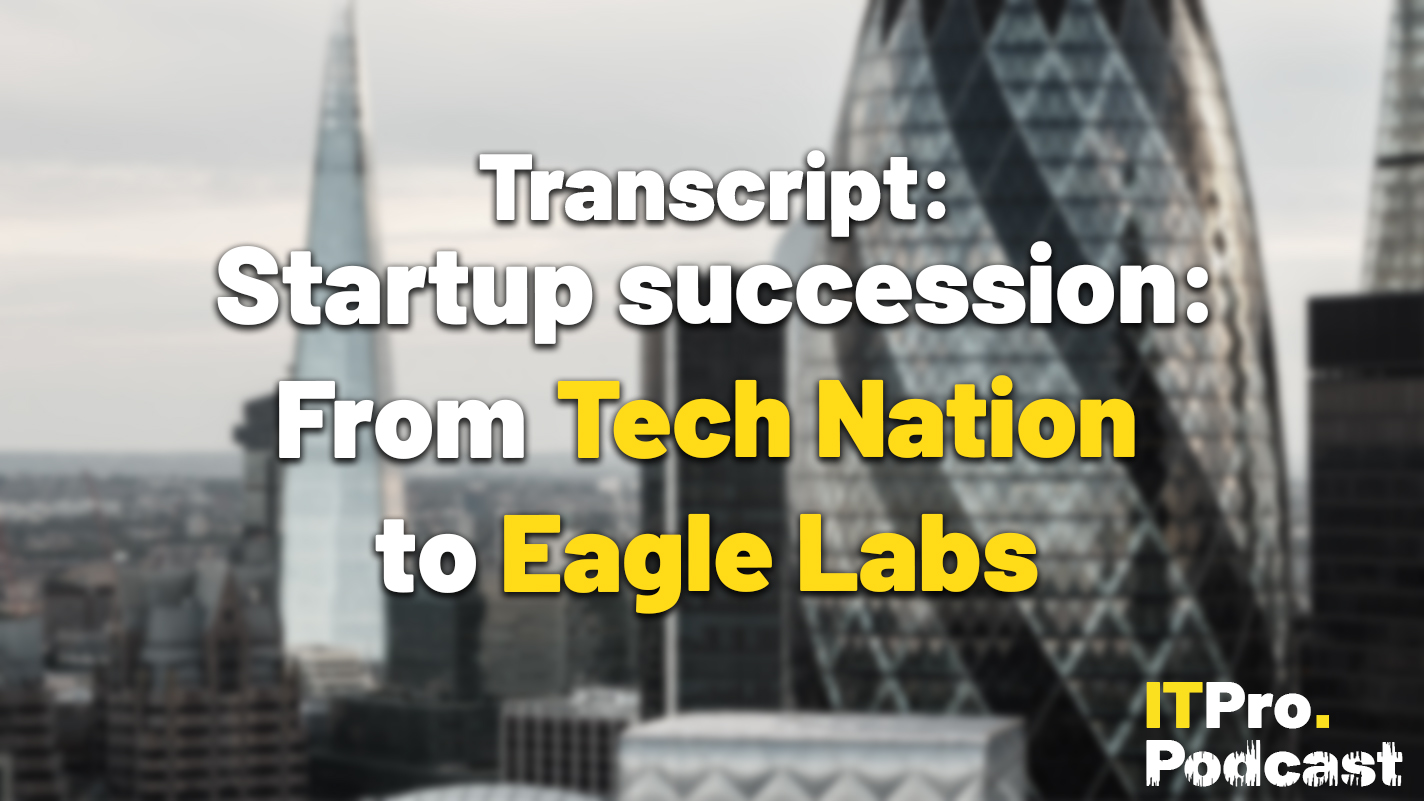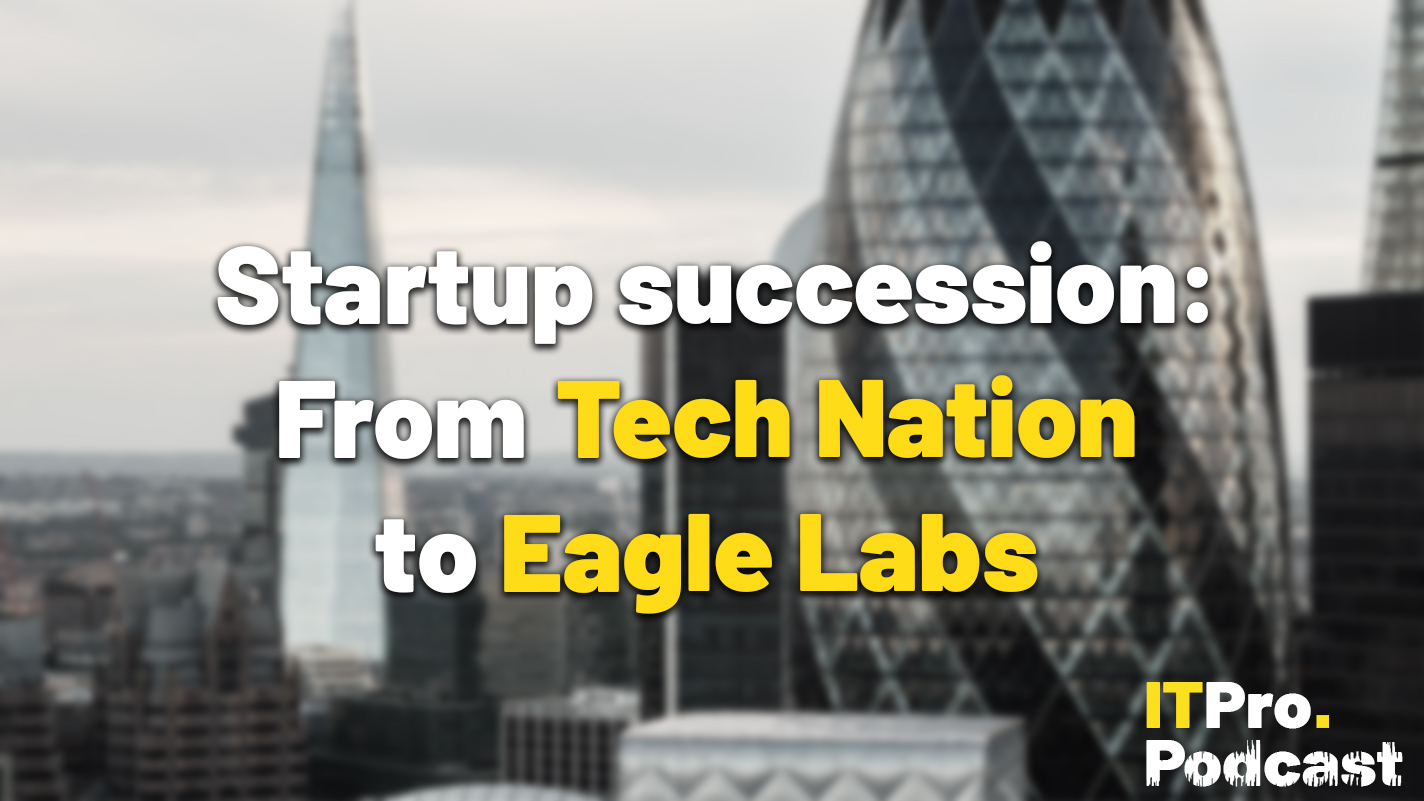Can the UK's tech sector still attract investment after Brexit?
Some sectors may be upping sticks for the continent, but the tone in tech is far more upbeat

Sign up today and you will receive a free copy of our Future Focus 2025 report - the leading guidance on AI, cybersecurity and other IT challenges as per 700+ senior executives
You are now subscribed
Your newsletter sign-up was successful
The uncertainty surrounding Brexit is causing concern for businesses in all sectors, including technology. In fact, a survey by the Institute of Directors found that nearly four out of ten IT firms might relocate their operations overseas due to Brexit.
Despite this, the UK's tech sector continues to experience record growth. Research from industry body Tech Nation shows that the industry will have raised $11 billion (8.8 billion) of investment by the end of 2019, compared to $8.7 billion (7 billion) the previous year. What's more, an estimated $1 billion (802 million) of foreign and domestic investment is raised per month. Will this trend continue post-Brexit?
From threats to opportunities
Although the details of Britain's departure from the EU are still unclear, it will no doubt have a significant impact on the business landscape whatever form it takes. Karl Foster, legal director at Blake Morgan, believes that Brexit will present both opportunities and threats to foreign investment in the UK regardless of whether a deal is reached. He says: "Firstly, currency fluctuation resulting from a no deal Brexit may make UK targets more attractive to foreign investors as assets will be proportionately cheaper when priced in stronger currencies.
"Likewise, much of the basis for investing in the UK will still apply; the English language, established regulatory and industry eco systems, leading academic institutions, an effective capital market system, a traditionally business friendly approach, and longstanding international outlook will remain. It's perhaps for these reasons investment in tech startups is hitting record levels despite Brexit uncertainty."
But he says the impact upon businesses that rely on cross border data flows with EU members is more uncertain. "The GDPR would be replaced with a UK version which would largely replicate the provisions of the GDPR. However, as the UK would be outside the EEA, it remains to be seen how the practical implications will be handled."
While the exact effects of Brexit aren't known, Foster takes the view that the threats may become opportunities for tech companies and could help to boost investment. He adds: "Much has been made of the potential shortage of EU workers in the picking of fruit and vegetables. Investment in robots could address these issues and potentially help address productivity issues generally. Blockchain technology has long been mooted as the next big thing in international trade to bring greater efficiencies to the supply chain. Perhaps a government endorsed strategy lead to widespread adoption."
Remaining optimistic
For many, there's a strong belief that UK-based technology companies will continue to flourish outside the EU. Gareth Jones, co-founder of coworking organisation Town Square Spaces, says decades of economic stability won't be eroded overnight post-Brexit. He tells IT Pro: "The UK remains an attractive place for investors historically, corruption has been low, there are world-class universities in every corner of the nation, excellent quality of life and there's connectivity to all major markets."
Sign up today and you will receive a free copy of our Future Focus 2025 report - the leading guidance on AI, cybersecurity and other IT challenges as per 700+ senior executives
He urges business owners to remain optimistic, despite operating in uncertain times. Jones adds: "It is important that tech founders focus on how attractive the UK tech sector is, and will remain to be, and contribute to the discussion on how they would like it to be in the future. The divisive nature of the debate is a quagmire of opinion and speculation, and founders need to remember they have control over one thing their business and its planned direction."
Kieran Abbott, founder of software development agency Big Lemon, notes how the industry has grown exponentially over the past decade. He believes this trend won't automatically stop because of Brexit. Abbott says: "The latest tech nation report supports the recently published ONS figures, which suggested that the number of tech-related jobs in the UK has risen by 38% since 2010.
"In Wales, this figure was as high as 83%, with the south-west of England boasting 41%, suggesting that other areas of the country are beginning to catch up with London and The City. This should pique the interest of potential investors as it shows there are untapped regions that could provide some exciting growth in the sector."
Businesses are also receiving lots of support in the run up to Brexit. Abbott explains: "From our personal experience, there has definitely been a lot more support for tech startups in Wales, and this has resulted in the increasing number of fast-growing tech-businesses. However, we've found many of our customers are getting support from independent organisations, rather than the government.
"Banks have realised that if they support more tech startups, then they can generate enough new customers to make accelerator programmes worthwhile. The fact that private enterprise is recognising the opportunity is encouraging, and suggests that the UK will still be an attractive place for investment post-Brexit as the tech sector in regions away from London continue to mature."
Success stories
Having recently secured a 2 billion investment deal from two private equity companies, enterprise software company Advanced is something of a British success story. The firm's CEO, Gordon Wilson, envisages Brexit having little impact on his business. Advanced is pushing ahead with accelerated growth plans in the meantime and has completed a transformation drive to ensure it's prepared for the UK's departure from the EU.
He explains: "Currently, in pre-Brexit state, the outcome and implications of current negotiations and the resulting political and economic landscape remain unclear. Advanced over the last three years has undergone a huge transformation to ensure we run as an agile, efficient business, able to respond quickly to the dynamically changing technology landscape, markets we serve and the wider political and economic climate."
Wilson claims that because Advanced remains heavily invested in the UK and is a software business, the impact of Brexit will likely be small. He continues: "95% of Advanced business is transacted in the UK [sterling to sterling] and so we cannot imagine being impacted by currency dynamics.
Like many UK tech businesses, Advances is a software provider, which means it will also be unaffected by one of the key areas of concern in a no-deal scenario: Import/export tariffs and changes in supply chain logistics.
"[We] expect zero impact on the availability of the software products and services we provide. Similarly we cannot imagine any impact on the costs of such. Our current position therefore is that we currently envisage Brexit will have a negligible impact on our business," Wilson concludes.
At the moment, it's unclear how Brexit will pan out. Whether or not the UK leaves the EU with a deal is unknown. However, what's clear is that regardless of legitimate concerns, plenty of British technology companies and founders remain optimistic about the outcome of Brexit and the potential opportunities it may bring.
Nicholas Fearn is a freelance technology journalist and copywriter from the Welsh valleys. His work has appeared in publications such as the FT, the Independent, the Daily Telegraph, the Next Web, T3, Android Central, Computer Weekly, and many others. He also happens to be a diehard Mariah Carey fan. You can follow Nicholas on Twitter.
-
 ITPro Excellence Awards winners unveiled
ITPro Excellence Awards winners unveiledIt's time to celebrate excellence in IT. Read on for the full list of winners...
-
 This new mobile compromise toolkit enables spyware, surveillance, and data theft
This new mobile compromise toolkit enables spyware, surveillance, and data theftNews The professional package allows even unsophisticated attackers to take full control of devices
-
 Is Rishi Sunak’s ‘Unicorn Kingdom’ a reachable goal or a mere pipedream?
Is Rishi Sunak’s ‘Unicorn Kingdom’ a reachable goal or a mere pipedream?Analysis Plunging venture capital investment and warnings over high-growth company support raise doubts over the ‘Unicorn Kingdom’ ambition
-
 Some Tech Nation programs could continue after Founders Forum acquisition
Some Tech Nation programs could continue after Founders Forum acquisitionNews The acquisition brings to a close a months-long saga over what the future holds for Tech Nation initiatives
-
 Podcast transcript: Startup succession: From Tech Nation to Eagle Labs
Podcast transcript: Startup succession: From Tech Nation to Eagle LabsIT Pro Podcast Read the full transcript for this episode of the ITPro Podcast
-
 The ITPro Podcast: Startup succession: From Tech Nation to Eagle Labs
The ITPro Podcast: Startup succession: From Tech Nation to Eagle LabsITPro Podcast Some small firms are already lamenting the loss of Tech Nation, but Barclays Eagle Labs has much to offer the sector
-
 Don’t count Barclays Eagle Labs out just yet – it can deliver in ways Tech Nation never has
Don’t count Barclays Eagle Labs out just yet – it can deliver in ways Tech Nation never hasOpinion Tech Nation has a great track record, but Eagle Labs has the experience, the financial clout, and a clear-cut vision that will deliver positive results for UK tech
-
 UK tech sector could face a ‘unicorn winter’ amid spiralling economic conditions
UK tech sector could face a ‘unicorn winter’ amid spiralling economic conditionsNews Tech Nation’s final piece of industry research calls for action to support continued ecosystem growth
-
 "It's still not great": Industry divided on government's SMB tax relief package
"It's still not great": Industry divided on government's SMB tax relief packageNews The government’s handling of R&D tax credits has left SMBs with a “sense of disbelief”
-
 UK startup's Equinix deal marks step towards broad quantum computing access
UK startup's Equinix deal marks step towards broad quantum computing accessNews Businesses around the world will be able to use its quantum computing as a service platform through Equinix